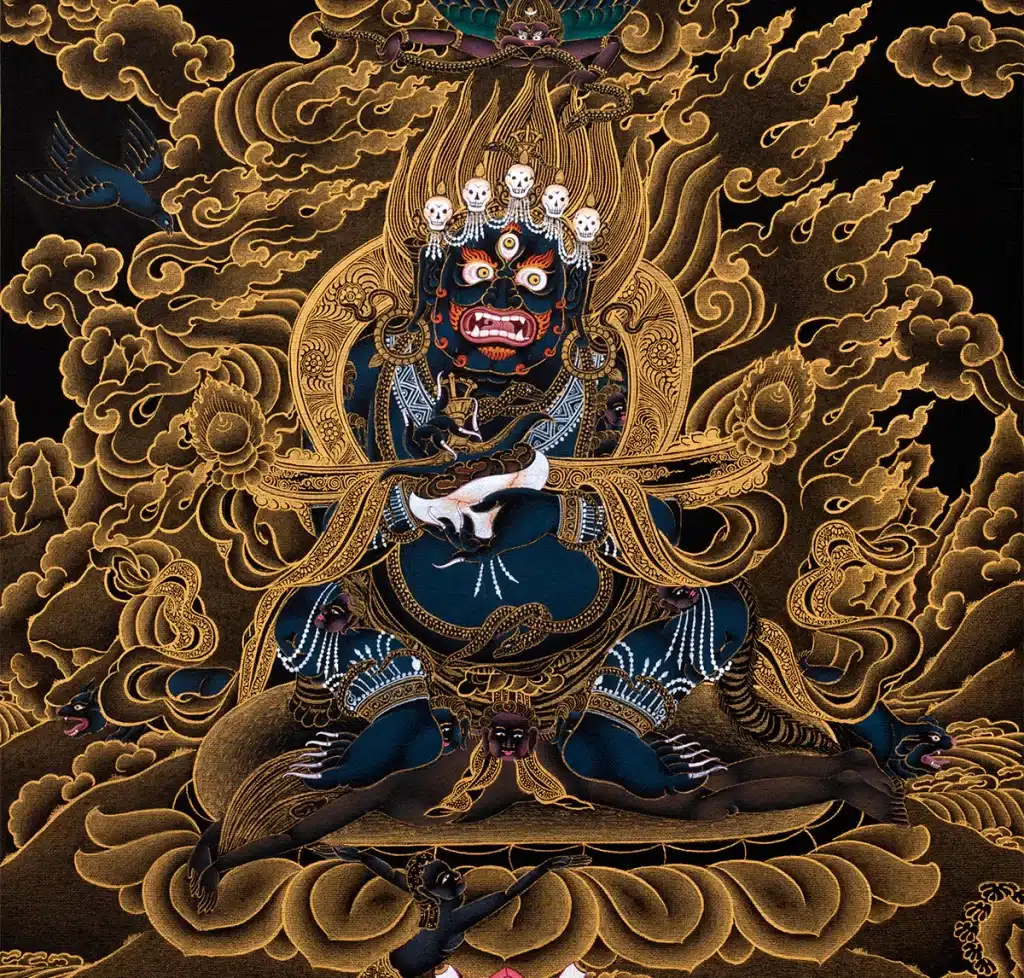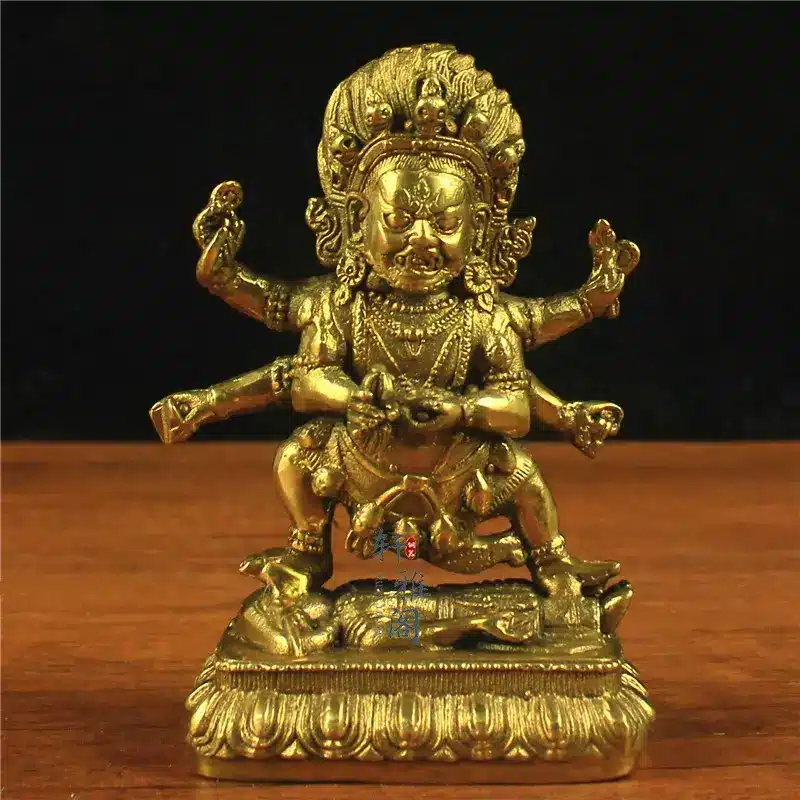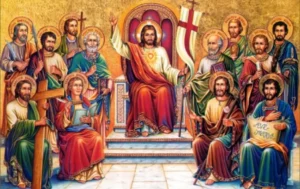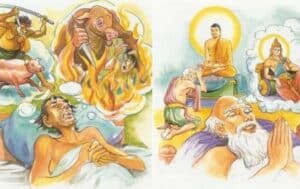Are you looking for a powerful tool to help remove negative energy and attract positive flow into your life? Look no further than the Mahakala mantra. Chanted by practitioners of Buddhism, this mantra invokes the fierce and protective energy of Mahakala, a deity known for his ability to overcome obstacles and ward off evil spirits.
With a rich history and tradition, the Mahakala mantra has been used for centuries to cultivate inner strength and bring good fortune to those who recite it. If you’re curious about the transformative power of the Mahakala mantra, read on to learn more about its meaning, and benefits.
Who is Mahakala?

Mahakala is a deity known in both Hinduism and Tantric Buddhism. In both religions, Mahakala is a fierce manifestation of Shiva and the consort of the goddess Mahakali. He prominently appears in the Kalikula sect of Shaktism. “Maha” means great, and “kala” denotes time; hence “Mahakala” means “timeless great.”
Additionally, Mahakala appears as a protective deity known as Dharmapala in Vajrayana, Chinese Esoteric Buddhism, and Tibetan Buddhism, as well as in the Chan and Shingon Tradition.
In Mandarin and Cantonese, he is known as Dahritian and Daiaihhaktin (大黑); in Korea, he is called Daeheukcheon (대흑천); in Vietnamese, he is called Dai Hac Thien, and in Japanese, he is referred to as Daikokuten (大).
Tantric practitioners chant the Mahakala mantra to remove negative energy, eliminate obstacles preventing positive flow, and attract wealth and good luck. The mantra is also known for its ability to ward off evil spirits, black magic, and ghostly harassment.
Mahakala usually appears black in color and is represented in 75 different forms, each signifying an incarnation of a different Buddha or Bodhisattva. The color black represents the complete absence of color and symbolizes his true nature as absolute or ultimate reality, transcendent in all forms.
Despite his wrathful attitude, Mahakala’s essential quality is to awaken compassion. His mantra are said to quell difficulties arising from depression, anger, and hatred. Moreover, he has the duty to protect the Dharma from demons and devils.
According to Khenpo Karthar Rinpoche, a senior lama of the Karma Kagyu school of Tibetan Buddhism, “Mahakala has never harmed any sentient being, even the most subtle. He continuously benefits sentient beings through the unremitting efforts of the enlightened mind.”
White Mahakala represents prosperity and wealth, while Black Mahakala represents anger that arises from compassion. In this form, he demonstrates his determination to overcome obstacles hindering the happiness of sentient beings.
What is protectors deity?
The protectors or wrathful deities in Buddhism known as Dharmapāla or Dhammapāla. This is the protectors who protect Buddhism and Buddhists. Those who vow to follow the Sādhana and recite the mantra are blessed by those gods.
The Symbolic meaning of Mahakala

The symbolic meaning of Mahakala is related to protection, elimination of obstacles, and overcoming negative energy. As a fierce manifestation of Shiva, Mahakala represents the power and determination needed to overcome the challenges of life.
The black color symbolizes the absence of color and represents Mahakala’s true nature as the ultimate reality that transcends all forms. Mahakala’s wrathful appearance also represents the power to overcome negativity and protect against evil.
Mahakala, the fierce manifestation of Shiva, is depicted in different forms depending on the teachings of various schools of Buddhism. Mahakala Bernagchen, for instance, from the Karma Kagyu school, is portrayed with two arms holding weapons and a large mouth.
In contrast, Mahakala with four arms holding weapons serves as the guardian of the Drikung Kagyu school, and Mahakala with six arms holding weapons is associated with the Gelugpa school, where each arm represents one of the six perfections: patience, generosity, diligence, morality, wisdom, and meditation.
According to Jeff Watt, a leading scholar of Tibetan texts, there is an incarnation of the Bodhisattva Avalokiteshvara that appears in the form of Mahakala, known as Shangpa Kagyu Mahakala. This form, with six arms and standing, was adopted by Tsongkhapa, the Tibetan Buddhist monk who founded the Gelugpa school.
In another image, Mahakala sits on a white elephant and holds a wish-fulfilling jewel to bless sentient beings. The jeweled vase in a sea of wine represents wealth that arises from spiritual methods. Mahakala wears a crown with five skulls that represent the five poisons: attachment, aversion, ignorance, pride, and jealousy, which transform into the five wisdoms. He also has three eyes that signify clear understanding and vividly manifest the three kayas of the Buddha.
In Japan, Mahakala is considered the god of fortune who brings luck, wealth, and prosperity to families. He is often portrayed holding a golden hammer and sitting on a pail of rice, with rats nearby. This is why Buddhists chant his mantra to attract good fortune and luck. Additionally, Mahakala served as a guardian deity for the ruler of Mongolia – Genghis Khan – during his reign.
The Benefits of chanting Mahakala mantra
Like other mantras in Buddhism, Mahakala’s mantra also has many different versions:
Om Shri Mahakala Hum Phat
Om Mahakalaya Soha
Om Benza Nara Trim Trim Hung Hung Phet Phet Soha
Chanting the Mahakala mantra is believed to offer a range of benefits in Buddhism. The mantra is considered to be a powerful tool to eliminate negative energy and remove obstacles that prevent positive flow. It is believed that chanting the mantra can help practitioners attract wealth, good luck, and success in their endeavors.
In addition to its positive effects on one’s material life, the Mahakala mantra is also known for its ability to ward off evil spirits, black magic, and the harassment of ghosts. It is considered a potent tool for spiritual protection, helping to shield the practitioner from negative energies and influences.
Moreover, Mahakala is a protective deity in Vajrayana, Chinese Esoteric Buddhism, and Tibetan Buddhism. It is believed that the blessings of Mahakala can help quell difficulties arising from depression, anger, and hatred. Despite his wrathful appearance, Mahakala’s essential quality is to awaken compassion in practitioners.
Chanting the Mahakala mantra is seen as a way to invoke the deity’s blessings and protection, and to establish a connection with Mahakala’s energy and wisdom. Through regular practice, practitioners can develop a deeper understanding of the deity and the ways in which Mahakala’s power can support their spiritual growth and wellbeing.





